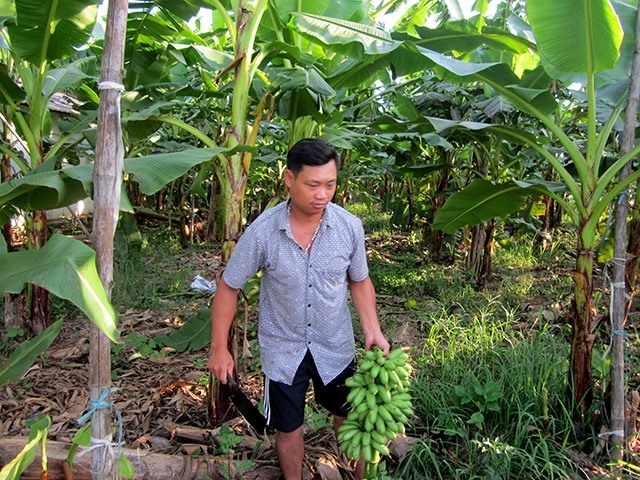 Society
Society

“I started selling fruit in Hà Nội several years ago. At that time, income from this business was just enough to cover my daily needs. Fortunately, a cousin of mine raised the idea of renting land in the Hồng (Red) River’s mudflats to plant fruit,” said 48-year-old Nguyễn Văn Tá.
 |
| Nguyễn Đình Tá picks bananas. The fruit garden has yielded substantial profits. – Photo nhandan.com.vn |
HÀ NỘI – “I started selling fruit in Hà Nội several years ago. At that time, income from this business was just enough to cover my daily needs. Fortunately, a cousin of mine raised the idea of renting land in the Hồng (Red) River’s mudflats to plant fruit,” said 48-year-old Nguyễn Văn Tá.
A native of Hưng Yên Province, Ta moved to Ha Noi in 2008 to escape poverty and started hawking fruit from his rusted bicycle on the streets and small alleys of the city.
In 2010, his wife followed him to the big city. They decided to lease more than 21,000sq. m in Hồng (Red) River’s mudflats, planning to turn the land into a fruit garden.
His neighbours did not share his optimism. They told Nhân Dân (People) newspaper that Ta’s family was most reckless. He borrowed VNĐ700 million (US$35,000), including a bank loan of VNĐ500 million ($25,000) for which he mortgaged his parents’ house, and another VNĐ200 million ($10,000) on the black market.
Tá said that he paid VNĐ300 million for a three-year land contract, using the rest for land reclamation and other preparations. A year later, Tá and his wife completed readying the land and began planting.
His family planted bananas, gauvas, longans and papayas in the mudflats, which are nutrious and suitable for fruit trees, saving money on fertilizer. Irrigation water, in addition, is readily accessible, he told the paper.
From one dilapidated bicycle, Tá now owns a truck to ship fruit and two kiosks in the markets of Long Biên District. He also hires six farmers and two shopkeepers to operate the business.
Tá’s family is not the only case. Hồng River’s mudflats has brought life-changing opportunities for many other farmers, such as 64-year-old Lê Ngọc Minh or 49-year-old Phạm Thị Hoa.
Despite many obstacles, Tá, Minh and Hoa said that farming on mudflats was much easier than runing small businesses in the city, where rents have risen considerably in revent years.
The mudflat is located in Long Biên District, Hà Nội. Some 300 families hold househould registration there and 1,300 other residents have migrated there from other provinces.
Not every one has a success story to tell. Lê Thị Hoà, originally from Ba Vì District, said that her family could only rent a small plot of land to plant vegetables. To earn money, she collects scrap metal every day.
In addition to farming, some people come up with other ideas to escape poverty.
Lê Thị Mỹ, for example, had her land leveled to build a mini football field. Charging an entrance fee of VNĐ60,000 to 80,000, she can earn hundreds of thousands to millions of dong per day. Following Mỹ’s initiative, several mini football fields have sprung up in the area.
Though many mudflat residents have improved their circumstances, they still live in temporary tents to easily manage their gardens. They also have to buy electricity at double the price due to the lack of electrical grid. Water prices are also high VNĐ80,000 to 100,000 for one cubic metre. Some families dig their own wells while others use river water for cooking and cleaning.
Local authorities of Long Biên District have built roads connecting Hồng River’s dam and the mudflats. The investment creates favourable conditions for the economic development of the area. – VNS




